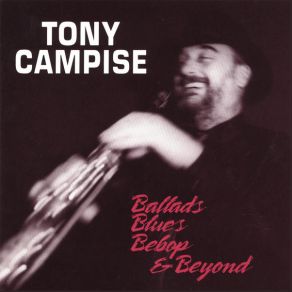Ballads, Blues , Bebop and Beyond
Download links and information about Ballads, Blues , Bebop and Beyond by Tony Campise. This album was released in 1994 and it belongs to Jazz genres. It contains 8 tracks with total duration of 55:44 minutes.

|
|
|---|---|
| Artist: | Tony Campise |
| Release date: | 1994 |
| Genre: | Jazz |
| Tracks: | 8 |
| Duration: | 55:44 |
| Buy it NOW at: | |
| Buy on iTunes $9.99 | |
Tracks
[Edit]| No. | Title | Length |
|---|---|---|
| 1. | Lush Life | 4:21 |
| 2. | Adam’s Blues | 6:40 |
| 3. | Teo | 10:37 |
| 4. | Impressions | 6:16 |
| 5. | Foothills | 8:48 |
| 6. | Haitian Fight Song | 8:26 |
| 7. | Peace | 4:12 |
| 8. | Canyon Of Spirits | 6:24 |
Details
[Edit]Tony Campise plays tenor, alto, baritone, and soprano sax; flute; bass clarinet — if they could retrofit a reed onto the diesel smokepipes of an 18-wheeler, he'd probably play that too. The Texan (primarily) tenor sax player is something of a local jazz legend, and no wonder; if jazz is like a religion, Campise is a perfect apostle. Ballads, Blues, Bebop & Beyond is his fourth release, featuring labelmates Joe LoCascio, Erich Avinger, and many of the same players from his last disc. Though this is primarily made up of standards, Campise again adds a few originals (including the boppin' "Foothills" and the atmospheric "Canyon of the Spirits"). The material moves around a lot, beginning with the startling simplicity of Billy Strayhorn's "Lush Life," only to change direction with Miles Davis' "Teo" (featuring Dennis Dotson on trumpet) and a dizzying dual-guitar duel on John Coltrane's "Impressions." If that's not cool enough for you, the band's take on Charles Mingus' "Haitian Fight Song" oozes hipness out of its pores (Dotson is again a genuine asset). Campise is clearly comfortable in a variety of venues, a shapeshifting sax player who can cut the notes up into little pieces, stretch them over a small eternity, and make them cry on command. Those accolades aside, however, many listeners would rather hear a jazz great playing good music than a good jazz band playing great music, and the latter is ultimately the best description for Ballads, Blues, Bebop & Beyond. Still, Campise and his kind are keeping the flame alive, living proof that as long as jazz affects a few people strongly, artists will continue to pour their craft into its re-telling.